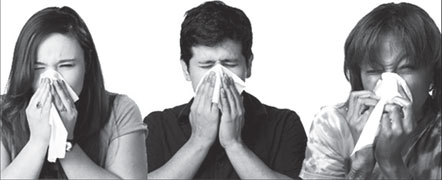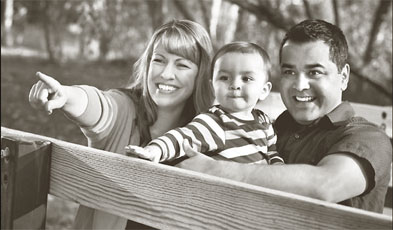|

'Walking pneumonia' are you a victim?
By Carol Aloysius
That wracking cough, sore throat, body aches and pains accompanied by
breathing difficulties may not be just a passing flu - or dengue fever
which could be over in a few days with bed rest. If neglected, it could
result in something more deadly like pneumonia which could be fatal to
young and old alike with compromised or weakened immune systems.
The symptoms are so similar to dengue fever that many patients aren’t
aware they are walking around with a viral flu that could lead to
pneumonia.
 “We call it walking pneumonia”, said a leading chest physician.
“People have to closely observe their own symptoms and take precautions
by visiting a qualified western doctor to get themselves examined if the
fever and breathing difficulties as well as the cough, cold and general
feeling of fatigue persists”. Viral flu, he said, is highly contagious
and extreme personal hygiene must be observed at all times to prevent
its spread. “We call it walking pneumonia”, said a leading chest physician.
“People have to closely observe their own symptoms and take precautions
by visiting a qualified western doctor to get themselves examined if the
fever and breathing difficulties as well as the cough, cold and general
feeling of fatigue persists”. Viral flu, he said, is highly contagious
and extreme personal hygiene must be observed at all times to prevent
its spread.
Consultant, Respiratory Chest Physician of the National Hospital for
Respiratory Diseases at Welisara, Dr Saman Kularatne explains what this
flu is, and warns of the possible complications if undetected or
neglected. He reiterates the need to maintain good personal hygiene and
stay at home when experiencing symptoms so as to prevent infecting
others.
Question: Almost everyone these days seem to be suffering from colds,
coughs, fever, heavy chests. Your comments?
Answer: Several Influenza viral strains have been identified as the
cause of the present flu like illness prevailing in the country these
days. Those who are suffering from the influenza infection however,
present with cough , cold, fever, sore throat, aches and body pains, as
well as and some with breathing difficulties.
Q. Is it normal at this time of the year with the onset of
monsoon rains?
A. Yes.
Q. How do you describe this illness? Is it an upper
respiratory disease or just dengue fever ?
A. Influenza is a viral infection mainly affecting the upper
respiratory tract. But it can cause serious pneumonia in vulnerable
groups.
It is a self-limiting illness in most people and different to dengue
fever. Both Influenza and Dengue are at epidemic levels in the country
now.
Q. How do you differentiate Influenza from the normal dengue
fever? What are the symptoms?
A. Since both these conditions are present with fever, one
should not try to differentiate these on symptoms and should see a
doctor early and should undergo investigations.
Otherwise you may have a risk of delayed recognition of dengue.
Q. Who are the high risk groups? Why are they more vulnerable
than other?
A. Pregnant women, those over 65 years of age and children
less than two years and those with non-communicable diseases such as
diabetes, kidney failure, chronic lung disease, neurological illness and
coronary heart diseases have been recognised as high risk groups. Severe
pneumonia and death due to influenza is high in these patients.
Q. Is having a non communicable disease delay or make
treatment more complicated?
A. Having a non-communicable disease such as diabetes, chronic
lung disease, kidney failure and coronary heart disease increases the
risk of getting more severe influenza disease and they are more prone to
develop secondary Bacterial pneumonia after viral influenza infection.
Q. Is it contagious? Can it be treated at home? What is the
procedure?
A. It is contagious. Typically, influenza is transmitted
through the air by coughs or sneezes, creating aerosols containing the
virus. Influenza can also be transmitted by direct contact with nasal
secretions, or through contact with contaminated surfaces.
Any person who has the symptoms should see a doctor early and those
who have evidence of severe disease with evidence of pneumonia need
hospital admission. Most of the patients have a minor illness and can be
treated at home.
Rest and adequate fluid intake is important. Those who develop
breathing difficulties should meet the doctor again without any delay.
Q. Will a good nutritious diet help ward off the disease or
reduce its complications?
A. Good nutritious diet and adequate fluid intake is anyway
important.
Q. Can drugs help? If so what kind of medication should you
take or not take?
A. Patients who are ill need admission and specific anti-viral
treatment and others can be treated at home with symptomatic treatment
and antibiotics if indicated.
Q. When should a patient see the doctor?
A. Patients should see a doctor very early, within one or two
days.
Q. What is the adverse health impacts of the disease?
A. Patients especially of the high risk group can develop
pneumonia due influenza virus and some can develop secondary bacterial
pneumonia.
Q. Will having an attack of this flu prevent future attacks?
A. No. The Influenza virus can change and the next epidemic
would be due to a different strain.
Q. What about anti-flu shots? Will getting a flu shot prevent
one getting the flu again? For how long will it give one immunity?
A. Vaccination is currently the leading effective means of
reducing the burden of morbidity and mortality of influenza in the
community. Since the virus is changing constantly, vaccination should be
done annually depending on the new strain.
Q. Will repeated attacks especially in the case of respiratory
flu affect the lungs and kidneys?
A. Repeated attacks of flu and secondary bacterial pneumonia
can cause permanent damage to the lungs.
Q. How does one prevent its spread?
A. With good personal hygiene and a good nutritious diet, and
avoiding getting wet, going out amidst large crowds, and washing one’s
hands well after returning home.
Q. Your message to the public?
A. People who are at risk of developing severe disease such as
pregnant mothers, elderly, patients with diabetes, chronic lung disease,
heart and kidney disease should avoid exposure as much as possible
(public transport, hanging around in public places, unnecessary
hospital/ clinic visits). Should seek medical advice early and
reassessment if symptoms are not getting better or worsened especially
if develop breathing difficulty. Rest and adequate fluid intake is
important.
**************
What Health officials have to say…
Chief Epidemiolgist Dr Paba Palihawadene, in a directive to hospital
directors and nursing staff emphasises the use of respiratory hygiene
followed by hand hygiene. On the latter, she tells nursing staff
attending on patients, “Wash hands with soap and water before and after
attending to patients. Cover nose and mouth during coughing and sneezing
with a medical mask, tissue, sleeve or flexed elbow.”
**************
What a health official at the National General Hospital had to say…
“Students must be warned against taking part in a sports event,
especially one needing strenuous activity such as a marathon, while
running a temperature or immediately after having had a viral flu.
There’s a viral flu running around now. After an attack of viral flu, it
is possible for a person to get myocarditis which affects the heart
muscles. While only a very small fraction (one percent) may develop this
condition, we strongly advise any student taking part in such events to
refrain from doing so.
Instead they should stay at home and rest in bed till they have fully
recovered to avoid complications.”
**************
What ScienceDaily says…
Upper respiratory infections, commonly referred to the acronym URI,
is the illness caused by an acute infection which involves the upper
respiratory tract: nose, sinuses, pharynx, larynx, or bronchi. It is the
most common cause of days missed from work or school and one of the most
common reasons for a medical visit.
It is estimated that the average adult has from two to three URI-type
illnesses per year and the average child six to 10. In the United
States. This represents approximately one billion acute upper
respiratory illnesses annually.
Recent studies show that up to 98 percent of all cases are viral in
nature.
**************
What Health Education Bureau officials had to say…
Since this flu is transmitted mostly through nasal droplets, avoid
sending your child to school, if he shows symptoms of having caught the
disease. As young and old are vulnerable, keep your child at home even
if he or she is attending a day care or a crčche if he has fever , a
cold or body aches and pains.
Isolate the child from his siblings as far as possible, as close
contact can spread the disease. If the patient develops chest problems
such as breathing difficulties, DON’T give him antibiotics. Take him to
the nearest hospital or medical clinic and get him properly examined.
Give all the details of his case history to the examining physician and
the medication (if any) you have given.. Don’t allow the patient to be
in an air conditioned room or under fans. Give him plenty of hot drinks
and make sure he gets a good nutritious meal to build up his strength.
Above all, maintain good personal hygiene. When you have a cough, or
a cold don’t wipe your nose on the sleeve of your shirt. Cough into your
arm if you don’t have anything to cover your mouth. Ideally you should
use a disposable tissue as re-cycling used hankies can also spread the
disease.
Non-verbal clues about words boost a child's vocabulary
The clues that parents give toddlers about words can make a big
difference in how deep their vocabularies are when they enter school,
new research shows.
By using words to reference objects in the visual environment,
parents can help young children learn new words, according to the
research. It also explores the difficult-to-measure quality of
non-verbal clues to word meaning during interactions between parents and
children learning to speak.
 For example, saying, “There goes the zebra” while visiting the zoo
helps a child learn the word “zebra” faster than saying, “Let's go to
see the zebra.” For example, saying, “There goes the zebra” while visiting the zoo
helps a child learn the word “zebra” faster than saying, “Let's go to
see the zebra.”
Differences in the quality of parents’ non-verbal clues to toddlers
(what children can see when their parents are talking) explain about a
quarter (22 percent) of the differences in those same children's
vocabularies when they enter kindergarten, researchers found. The
results are reported in the paper, “Quality of early parent input
predicts child vocabulary three years later,” published in Proceedings
of the National Academy of Sciences.
“Children's vocabularies vary greatly in size by the time they enter
school,” said lead author Erica Cartmill, a postdoctoral scholar.
“Because preschool vocabulary is a major predictor of subsequent school
success, this variability must be taken seriously and its sources
understood.”
Scholars have found that the number of words youngsters hear greatly
influences their vocabularies. Parents with higher socioeconomic status
- those with higher income and more education - typically talk more to
their children and accordingly boost their vocabularies, research has
shown.
That advantage for higher-income families doesn't show up in the
quality research, however.
“What was surprising in this study was that social economic status
did not have an impact on quality. Parents of lower social economic
status were just as likely to provide high-quality experiences for their
children as were parents of higher status,” said co-author Susan
Goldin-Meadow. Although scholars have amassed impressive evidence that
the number of words children hear - the quantity of their linguistic
input - has an impact on vocabulary development, measuring the quality
of the verbal environment - including non-verbal clues to word meaning -
has proved much more difficult.
To measure quality, the research team reviewed videotapes of everyday
interactions between 50 primary caregivers, almost all mothers, and
their children (14 to 18 months old). The mothers and children, from a
range of social and economic backgrounds, were taped for 90-minute
periods as they went about their days, playing and engaging in other
activities. The team then showed 40-second vignettes from these
videotapes to 218 adults with the sound track muted. Based on the
interaction between the child and parent, the adults were asked to guess
what word the parent in each vignette used when a beep was sounded on
the tape.
A beep might occur, for instance, in a parent's silenced speech for
the word “book” as a child approaches a bookshelf or brings a book to
the mother to start story-time. In this scenario, the word was easy to
guess because the mother labelled objects as the child saw and
experienced them.
In other tapes, viewers were unable to guess the word that was beeped
during the conversation, as there were few immediate clues to the
meaning of the parent's words. Vignettes containing words that were easy
to guess provided high-quality clues to word meaning.
Although there were no differences in the quality of the interactions
based on parents’ backgrounds, the team did find significant individual
differences among the parents studied. Some parents provided non-verbal
clues about words only five percent of the time, while others provided
clues 38 percent of the time, the study found.
The study also found that the number of words parents used was not
related to the quality of the verbal exchanges.
“Early quantity and quality accounted for different aspects of the
variance found in the later vocabulary outcome measure,” the authors
wrote. In other words, how much parents talk to their children
(quantity), and how parents use words in relation to the non-verbal
environment (quality) provided different kinds of input into early
language development.
“However, parents who talk more are, by definition, offering their
children more words, and the more words a child hears, the more likely
it will be for that child to hear a particular word in a high-quality
learning situation,” they said. This suggests that higher-income
families’ vocabulary advantage comes from a greater quantity of input,
which leads to a greater number of high-quality word-learning
opportunities. Making effective use of non-verbal cues may be a good way
for parents to get their children started on the road to language.
ScienceDaily
Environment may affect dishonest behaviour
A new study from researchers at leading business schools reveals that
expansive physical settings (e.g. having a big desk to stretch out while
doing work or a large driver's seat in an automobile) can cause
individuals to feel more powerful, and in turn these feelings of power
can elicit more dishonest behaviour such as stealing, cheating, and even
traffic violations.
“In everyday working and living environments, our body postures are
incidentally expanded and contracted by our surroundings - by the seats
in our cars, the furniture in and around work-spaces, even the hallways
in our offices - and these environments directly influence the
propensity of dishonest behaviour in our everyday lives,” said Andy Yap,
a key author of the research in Columbia Business School.
 The study states that while individuals may pay very little attention
to ordinary and seemingly innocuous shifts in bodily posture, these
subtle postural shifts can have tremendous impact on our thoughts,
feelings and behaviour. The study states that while individuals may pay very little attention
to ordinary and seemingly innocuous shifts in bodily posture, these
subtle postural shifts can have tremendous impact on our thoughts,
feelings and behaviour.
Building on previous research that expansive postures can lead to a
state of power, and power can lead to dishonest behaviour, the study
found that expanded, nonverbal postures forced upon individuals by their
environments could influence decisions and behaviour in ways that render
people less honest.
“This is a real concern. Our research shows that office managers
should pay attention to the ergonomics of their work-spaces. The results
suggest that these physical spaces have tangible and real-world impact
on our behaviors” said Yap.
The research includes findings from four studies conducted in the
field and the laboratory.
One study manipulated the expansiveness of work-spaces in the lab and
tested whether “incidentally” expanded bodies (shaped organically by
one's environment) led to more dishonesty on a test.
Another experiment examined if participants in a more expansive
driver's seat would be more likely to “hit and run” when incentivised to
go fast in a video-game driving simulation.
- Medical Xpress
|


